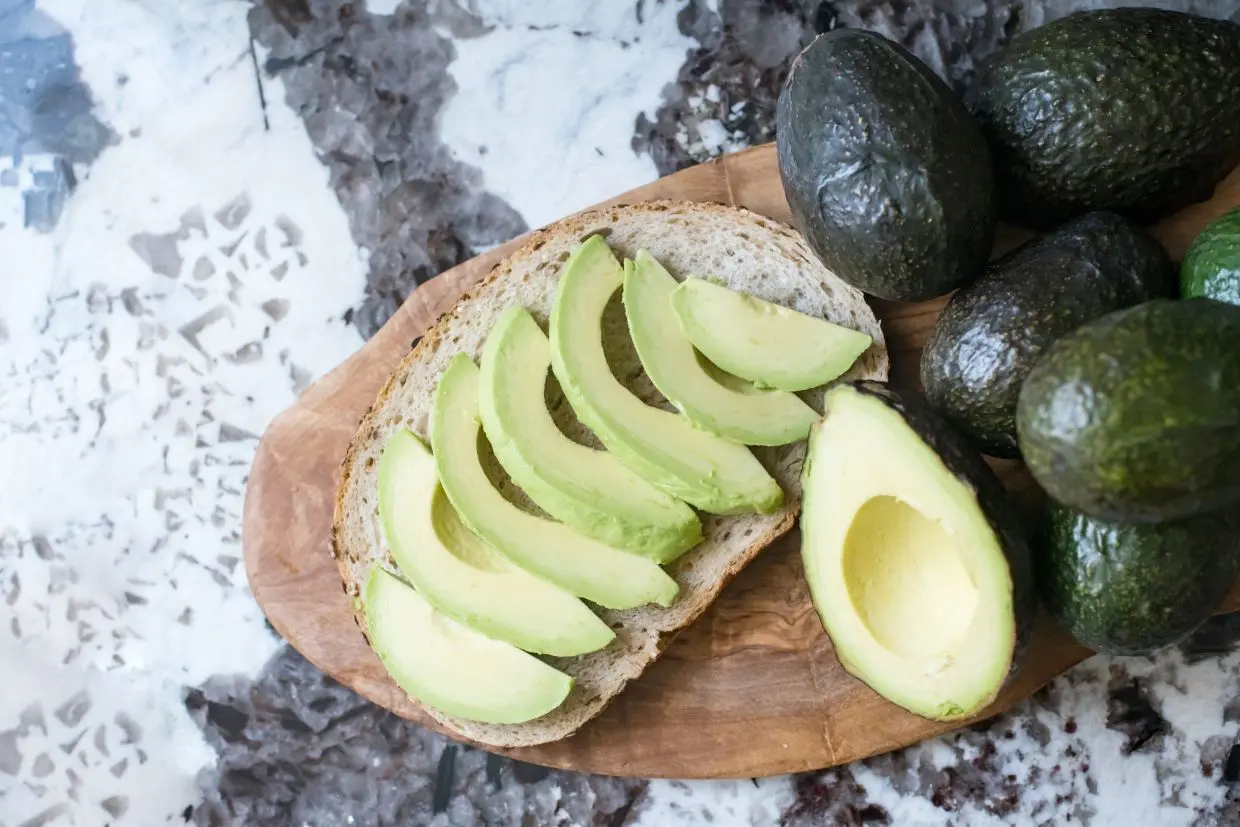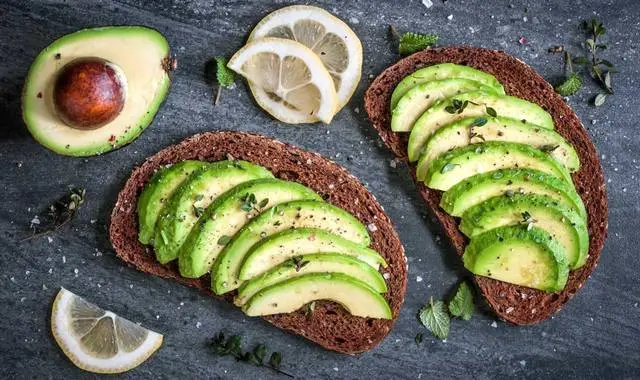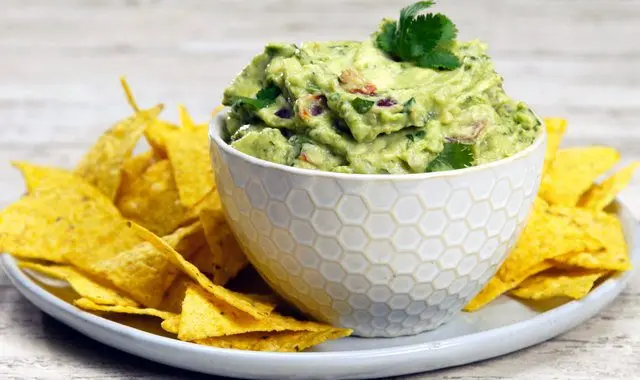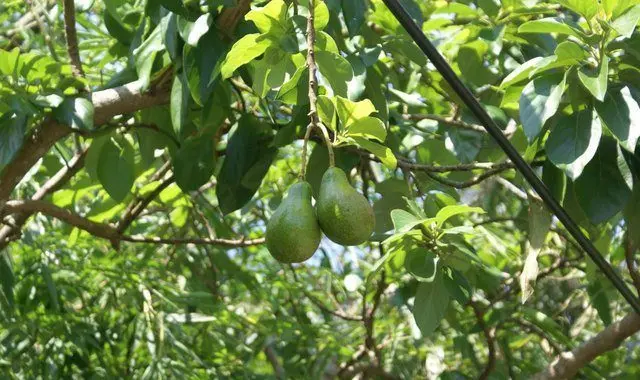Contents
- General avocado benefits
- Benefits for women
- Benefits for men
- Harm and contraindications
- Why you shouldn’t eat a lot of avocados
- Chemical composition of the product
- Conclusions
- Sources of Research
- Additional useful information about avocado
- Avocado history
- The use of avocados in medicine
- The use of avocado in cooking
- Popular questions and answers
Avocado Is an exotic fruit that grows on trees. This fruit is great for both sweet and savory dishes. Avocado is an oily product, because of its fat content, many people have not eaten it for a long time. However, to date, thanks to numerous studies by nutritionists, it has been found that, although avocados contain fats, they are vegetable and very beneficial for health.
Avocado is the fruit of the avocado tree (Persea Americana), in the laurel family. It is a very healthy fruit, due to the content of healthy fats, minerals (potassium) and vitamins (folic acid).
This fruit is the perfect addition to any appetizer or meal. It saturates the body with healthy fats, fiber, folic acid, vitamin A, potassium and many other substances. The benefits of avocado are obvious – it improves heart function, normalizes hormonal balance and has many more health benefits.
General avocado benefits
1. Improves the work of the heart.
Avocado strengthens the heart, stabilizes blood lipids. This is due to the fatty acids it contains. In terms of chemical composition, avocado has about 71% monounsaturated fatty acids, 13% polyunsaturated fatty acids, and 16% saturated fatty acids.
A high amount of monounsaturated fat blocks the development of atherosclerosis. In addition to the monounsaturated fat found in avocados, numerous studies have shown that it is also rich in fiber, magnesium and potassium, which can significantly lower cholesterol and high blood pressure.
Just one week of the experiment showed that people with no particular health complaints, but consuming avocados daily, decreased their cholesterol levels by 16%. The results obtained in the group of people with high blood cholesterol levels were even better. Their cholesterol levels dropped by 21%, and their overall health improved.
2. Reduces the risk of metabolic syndrome.
Eating avocados significantly reduces the risk of metabolic syndrome, which is a complex of metabolic disorders, an increased risk of cardiovascular disease and type 50 diabetes. Poor tissue response to insulin exposure may be one reason. Overall, studies have shown that people who consistently ate avocados had a XNUMX% lower risk of developing metabolic syndrome than people who did not normally consume it.
3. Prevents cancer.
Thanks to numerous studies, avocados are recognized as an active cancer-fighting product. The American Journal of Healthy Nutrition published the results of a study claiming that the phytochemicals and phytonutrients in avocados are strong enough to prevent the use of chemotherapy in people with oral cancer.
Scientists at Ohio University tried to figure out exactly how this process takes place. Preliminary research published in 2011 suggests that the phytochemicals and phytonutrients contained within each avocado may hold a clue to its cancer-fighting properties. Research has shown that phytochemicals help stop the cell cycle from growing cancer cells. These elements, found in avocado, extract 50% of methanol by proliferating human lymphocyte cells, and also reduce chromosomal changes.
Another reason why avocados are deservedly the # 1 fruit for preventing cancer and diabetes are monounsaturated fatty acids, which provide better protection against chronic disease.
4. Helps in losing weight.
If you want to lose weight faster, avocados can help you. Healthy fats will keep you energized and satiated, which will help you eat fewer meals a day overall. Avocados are perfect for both a snack and a full meal in salads and main dishes.
Always go for an avocado salad or a handful of nuts over foods that are free of healthy fats and leave you hungry, and can also lead to health problems (like reproductive problems, frequent mood swings, mental disorders). Studies have shown that people who eat avocado lost weight significantly faster.
5. Improves the functioning of the digestive system.
Avocados are a storehouse of fiber. Depending on the size of the fruit, it can contain between 11 and 17 grams of fiber. This is more than any other fruits, vegetables, beans and grains. For people with problems with the digestive tract, it is very important to eat foods high in fiber.
Dietary fiber helps to normalize the functioning of the intestines and beneficial bacteria in it, get rid of constipation and diarrhea. Fats are essential for the absorption of food and nutrients as they nourish the intestines. A low-fat diet can lead to constipation or symptoms of colon irritation characterized by abdominal pain.
6. Helps with diabetes.
A diet rich in healthy fats helps stabilize blood glucose levels in people with diabetes. This effect is achieved in just a few hours.
7. Improves hormonal balance.
Fatty acids play an important role in the regulation of the functions of the central nervous and reproductive systems. They contribute to the natural balance of hormones. Various neurotransmitters and hormones found in avocados have a beneficial effect on mood.
With regular consumption of avocados, the risk of depression, groundless anxiety, mental disorders, and other central nervous system problems is reduced. Natural antidepressants are synthesized from fatty acids.
8. Is a source of vitamin E.
Avocado is rich in vitamin E, which is considered to be the most powerful antioxidant. It helps to balance all processes in the human body. Vitamin E also actively protects the body from the harmful effects of free radicals due to polyunsaturated fatty acids.
9. Reduces blood pressure.
The avocado fruit is high in potassium and other important vitamins and minerals that help lower blood pressure and prevent many heart diseases.
10. Improves eyesight.
Due to the high content of carotenoids, lutein and fiber, avocado actively protects against all kinds of eye diseases. Such diseases include cataracts, glaucoma, macular degeneration and dry eye syndrome.
11. Helps the blood coagulation system to function well.
Contains Vitamin K, which is not destroyed during heat treatment and helps the blood coagulation system to function well.
12. Eliminates bad breath.
Bad breath is a direct consequence of problems with the digestive tract. Avocado has a beneficial effect on the digestive system, thereby eliminating bad breath.
13. Can be used as a substitute for baby food.
Avocado is great for eating not only for adults, but also for young children. It contains high levels of monounsaturated fats, which play an important role in the development of the baby. The creamy texture of the avocado fruit is ideal for children. It contains vitamins B2, B1, niacin, potassium, folic acid and magnesium to help children grow up physically strong and mentally developed.
14. Prevents arthritis.
For the prevention of arthritis, avocado is an excellent dietary supplement equivalent to soybeans. It has an anti-inflammatory effect on joint diseases, osteoarthritis, etc.
15. Strengthens the immune system.
This exotic fruit contains large amounts of vitamin E, which helps to increase immunity, protecting the body from harmful environmental factors and various stresses.
16. Promotes the body’s resistance to free radicals.
Recent research has found that avocados increase the ability of cells to fight free radicals. The experiment was carried out on yeast that was exposed to free radicals.
Avocado oil increased the resistance of yeast cells to free radicals. Thus, medical experts have suggested that avocado oil has a similar effect on human cells.
17. Prevention and prevention of stomach ulcers.
Avocado contains all the vitamins and minerals necessary for the prevention of various gastrointestinal diseases. In addition to the preventive effect, the fruit helps in the treatment of stomach ulcers, also due to its soft creamy structure.
18. Reduces the risk of kidney stones.
Avocados reduce the risk of kidney stones. Due to the reduced amount of calcium, it dissolves the formed stones and removes them from the body through the urethra.
19. Promotes cleansing of the body.
Avocado oil is rich in chlorophyll, which is a natural source of magnesium. Chlorophyll is one of the best natural substances that remove heavy metals from the body. It removes lead and mercury from the brain, kidneys, liver and other vital organs.
Avocado oil completely detoxifies the body and reduces the risk of many diseases. To ensure the cleansing effect of chlorophyll, regularly add avocado oil to salad dressings and other dishes.
20. Prevents periodontal disease and other dental diseases.
According to research, avocado oil helps in the prevention of periodontal disease, which is a progressive disease that can lead to tooth decay. The anti-inflammatory properties of avocados, thanks to the enzymes they contain, reduce gum inflammation, thereby preventing periodontal disease.
21. Eliminates swelling.
100 g of avocado contains one-fifth of the body’s need for potassium. This trace element is a sodium antagonist, which is harmful to the body, as it retains water in it. If the diet is high in sodium but low in potassium, it leads to high blood pressure and the formation of edema. Eating avocados eliminates the harmful effects of sodium.
22. Prevents the occurrence of arrhythmias.
Potassium is essential for the functioning of all electrical tissues in the body. These tissues include the nervous and conducting systems, as well as the heart. Without potassium, the proper functioning of these systems is impossible, which means that the muscles will become weaker, and nerve conduction will decrease. With a lack of potassium, arrhythmia occurs, which can lead to cardiac arrest.
Benefits for women
23. Helps with toxicosis in pregnant women.
Avocados contain a large amount of vitamin B6, which eliminates the symptoms of toxicosis.
24. Provides antibacterial and antifungal effects.
Thanks to its antibacterial and antifungal properties, avocados are beneficial for women during menopause. Namely, they eliminate insomnia, constipation and disorders of the nervous system. Avocado reduces hot flashes and normalizes hormone balance.
Skin Benefits
25. Moisturizes and nourishes the skin.
Avocado provides a healthy complexion. It can be used as a basic moisturizer in the morning and evening. For daily skin hydration, most beauticians and skin care specialists recommend the regular use of avocado oil, because it contains vitamins C, A and E, which have a beneficial effect on the condition of the skin.
26. Heals wounds and cleanses the skin.
Avocado has the ability to remove dead cells, thereby cleansing the skin. Avocado oil promotes faster healing of wounds and scratches. In addition, it is ideal for use as a hygienic lipstick. Avocado oil will help prevent chapped lips and heal cracks.
Hair Benefits
27. Makes hair beautiful and healthy.
Avocados can also be used in homemade hair masks. It gives hair shine, makes it soft and silky thanks to monounsaturated fats and vitamins.
Benefits for men
28. Strengthens libido.
Avocados are credited with being an aphrodisiac. It is a means that enhances sex drive and improves potency.
29. Is a prophylactic against infertility.
Avocado improves sperm motility, thereby increasing the chances of successful fertilization.
30. Promotes prostate health.
Also, monounsaturated fatty acids can significantly reduce the risk of inflammation in the body. Beta-sitosterol protects against prostate disease, it reduces the risk of developing prostate cancer.
https://www.youtube.com/watch?v=pPz1N1_WMBI
Harm and contraindications
1. Not recommended for pregnancy and breastfeeding.
When eating avocados, as a result, the amount of milk may decrease, as well as the functionality of the mammary glands. Another negative consequence can be an upset stomach of the child.
2. Individual intolerance.
A contraindication to the use of avocado may be an individual intolerance to the components contained in it. A negative consequence can be vomiting and allergic reactions of the skin, such as itching, redness of the skin, eczema, rash, hives. In very rare cases, excessive consumption of avocado fruit can lead to flu, paralysis, nausea, gastrointestinal distress, vomiting, migraines, fever, drowsiness, and even asthma.
3. Negative effects on the liver.
One of the serious reasons for refusing to consume the juicy fruits of this plant is the toxic effect on the human liver, due to the content of certain types of essential oils.
You should be especially careful with Mexican avocado varieties containing estragole and anethole, which have carcinogenic properties. People suffering from dysfunctional liver disorders should refrain from consuming this product.
4. Allergic reaction.
Avocados contain latex (the milky sap of rubber plants). It increases the level of serum IgE antibodies in the body, hypersensitivity to which can also cause allergic reactions. Avocados can cause mouth allergies, which can cause itching, mouth discomfort and swelling of the tongue.
5. Abuse of avocados.
Eating large quantities of avocados is undesirable. It is worth limiting the use of this fruit if you are on a diet, since the fruit is quite high in calories. Excessive consumption of avocados is also discouraged due to possible upset stomach, gastrointestinal irritation and discomfort.
6. Interaction of avocados with drugs and medicines.
The use of avocados in large quantities can reduce the effect of anti-inflammatory drugs, as well as lead to a decrease in the level of red blood cells.
Why you shouldn’t eat a lot of avocados
If you abuse the fruit, you may experience health problems.
Weight gain
Avocados are rich in healthy, high-calorie vegetable-type fats. An average fruit can contain about 25 g of fat and almost 300 kcal. Avocado fat is good for the body, but you need to eat it in moderation.

Nutrient deficiency
In order for the diet to be as balanced as possible, other types of food are also needed. Avocados should only be part of the most varied diet along with meat, fish or vegetables.
For example, the fruit does not contain protein and some minerals necessary for the body. Therefore, it is definitely not worth replacing part of a full-fledged diet with them.
Liver damage
Avocados can be harmful for those with liver problems. It contains anethole or estragole, which even in moderate amounts can be toxic to the liver and exacerbate liver disease in susceptible individuals.

Allergy Risk
Avocado is an exotic fruit, far from being completely understood by the Russian enzymatic system. Some may develop allergies or intolerances associated with eating avocados. In this case, you should completely abandon it to avoid unwanted reactions.
Absorption of cholesterol
With some genetic characteristics of the body and a high level of cholesterol in the blood, avocados can increase it even more. The fact is that it is rich in omega-3 fatty acids, which can block the proper absorption of cholesterol.
Chemical composition of the product
Avocado Nutritional Value (100g) and Percent Daily Values:
- The nutritional value
- Vitamins
- Macronutrients
- Trace Elements
- calories 160 kcal – 11,24%;
- proteins 2 g – 2,44%;
- fats 14,7 g – 22,62%;
- carbohydrates 1,8 g – 1,41%;
- dietary fiber – 6,7 g – 33,5%;
- water 72,23 g – 2,82%.
- And 7 mcg – 0,8%;
- S 10 mg – 11,1%;
- To 21 μg – 17,5%;
- B1 0,067 mg – 4,5%;
- B2 0,13 mg – 7,2%;
- B4 14,2 mg – 2,8%;
- B5 1,389 mg – 27,8%;
- B6 0,257 mg – 12,9%;
- B9 81 μg – 20,3%;
- beta-carotene 0,062 mg – 1,2%;
- PP 1,738 mg – 8,7%.
- potassium 485 mg – 19,4%;
- calcium 12 mg – 1,2%;
- magnesium 29 mg – 7,3%;
- sodium 7 mg – 0,5%;
- phosphorus 52 mg – 6,5%.
- iron 0,55 mg – 3,1%;
- manganese 0,142 mg – 7,1%;
- copper 190 μg – 19%;
- selenium 0,4 μg – 0,7%;
- fluorine 7 μg – 0,2%;
- zinc 0,64 mg – 5,3%.
Conclusions
Avocados are amazing health benefits. It helps to heal even serious diseases.
Useful Properties
- Improves heart function.
- Reduces the risk of metabolic syndrome.
- Prevents cancer.
- Helps in weight loss.
- Improves the functioning of the digestive system.
- Helps with diabetes.
- Improves hormonal balance.
- It is a source of vitamin E.
- Reduces blood pressure.
- Improves eyesight.
- Eliminates bad breath.
- It can be used as a substitute for baby food.
- Prevents arthritis.
- Strengthens immunity.
- Promotes the body’s resistance to free radicals.
- Prevents and treats stomach ulcers.
- Reduces the risk of kidney stones.
- Helps cleanse the body.
- Prevents periodontal disease and other dental diseases.
- Eliminates swelling.
- Prevents the occurrence of arrhythmias.
- Helps with toxicosis in pregnant women.
- It has antibacterial and antifungal effects.
- Moisturizes and nourishes the skin.
- Heals wounds and cleanses the skin.
- Makes hair beautiful and healthy.
- Strengthens libido.
- It is a prophylactic against infertility.
- Promotes prostate health.
Harmful properties
- Not recommended for pregnancy and breastfeeding.
- There may be individual intolerance.
- It has a negative effect on the liver.
- May cause an allergic reaction.
- Avocados should not be overused.
- May interact negatively with drugs and medication.
Sources of Research
The main studies on the benefits and dangers of avocados have been carried out by foreign doctors and scientists. Below you can find the primary sources of research on the basis of which this article was written:
Sources of Research
- 1. https://www.ncbi.nlm.nih.gov/pubmed/23638933
- 2. https://ndb.nal.usda.gov/ndb/foods/show/2206?fgcd=&manu=&lfacet=&format=&count=&max=35&offset=&sort=&qlookup=avocado
- 3. https://www.livestrong.com/article/84095-essential-fatty-acids-avocados/
- 4.https: //www.ncbi.nlm.nih.gov/pmc/articles/PMC3664913/
- 5. https://www.ncbi.nlm.nih.gov/pubmed/8987188
- 6. https://www.emaxhealth.com/1275/what-you-may-not-know-about-avocado-should
- 7. https://www.ncbi.nlm.nih.gov/pubmed/23282226
- 8. https://www.ncbi.nlm.nih.gov/pubmed/12134711
- 9. https://www.ncbi.nlm.nih.gov/pubmed/15735074
- 10. https://www.ncbi.nlm.nih.gov/pubmed/19373608
- 11.https: //www.ncbi.nlm.nih.gov/pmc/articles/PMC3148526/
- 12. https://www.ncbi.nlm.nih.gov/pubmed/22070054
- 13. https://www.ncbi.nlm.nih.gov/pubmed/9665107
- 14. http://www.lifeextension.com/Magazine/2005/6/report_prostate/Page-01
- 15.https: //www.ncbi.nlm.nih.gov/pmc/articles/PMC3545982/
- 16. https://www.ncbi.nlm.nih.gov/pubmed/15661480
- 17. https://www.emaxhealth.com/1275/what-you-may-not-know-about-avocado-should
- 18. https://www.ncbi.nlm.nih.gov/pubmed/21298116
Additional useful information about avocado
How to use
1. In cooking.

It is best to consume fresh avocados. The pulp of the fruit can be substituted for mayonnaise and butter. This fruit goes well with seafood, eggs, chicken, turkey, bread, rice and other foods. Use it as a fat substitute for baked goods. Add avocado to salad or sushi. Make the famous Mexican guacamole sauce at home. Well suited as an addition to various types of soups and broths. Ideal for desserts, puddings, milkshakes, smoothies and more.
2. Cooking guacamole.

To prepare guacamole, cut the avocado into 2 halves and remove the pit. Next, you need to draw each half with a knife along and across, forming a “lattice”, and then scoop out the pulp from the surface of the skin with a spoon. Add finely chopped tomatoes, onions, chili peppers and, if desired, lemon juice to the pulp. Mix everything, the dish is ready. You can use a blender to prepare this dish, otherwise the technology remains the same.
3. In cosmetology.
Avocado, as well as the oil of this fruit, is added to cosmetics for hair, face and body skin care. Oil is extracted from the pulp of the fruit and masks are made. They prevent aging, have moisturizing and nourishing properties.
How to choose
Supermarkets typically sell two types of avocados. Hass avocado has a bumpy skin and changes color depending on the degree of ripeness from dark green to purplish black. The fruit peels off easily. The flesh of this avocado variety is pale green in color. Another common variety is called Bacon. He’s bigger than Hass. The ripe fruit of this variety has a very thin, smooth skin of a classic green color. The pulp is pale yellow in color.
When choosing an avocado, you should focus on the following recommendations:
- Ripe avocados should be soft without any brown spots.
- Hard avocados are not edible.
- Fruit that is too soft is overripe and unpalatable.
- The avocado skin should be uniform in color, with a dense and rough texture.
- If, when shaking the avocado, the bone inside taps, then such a fruit should be taken.
How to store
- Refrigerated avocados are not recommended.
- It should be kept away from sunlight.
- An unripe avocado will ripen on its own if stored in a dry, ventilated room at room temperature and without exposure to sunlight.
- Ideal storage conditions are room temperature, paper bag or ventilated container, dry place.
- Ripe avocados do not store for a long time, it is better to eat it in the first 2 days after purchase.
History of occurrence
The homeland of avocados is South America, Mexico. According to archaeological evidence, avocados have been cultivated since the third millennium BC. Archaeologists have found some drawings and exhibits indicating that avocado has been known to man for about 7-10 thousand years. The Aztecs considered avocados to be the fruit of kings, they did not allow their daughters to leave the house during the harvest. What is the reason for this is unknown. Perhaps this is how they tried to protect their child from unforeseen consequences.
Avocados were discovered all over the world by Spanish colonists who arrived in Mexico and borrowed this fruit from the Aztecs. Then they passed on this fruit to the British. In the second half of the XNUMXth century, avocados began to be cultivated in North America.
The first seedlings were introduced to California in 1856, to Indonesia in 1750, to Brazil in 1809, to Israel in 1908, and in South Africa and Australia these fruits appeared only at the end of the XNUMXth century. The largest producers and exporters of avocados are recognized: Mexico, Chile, USA, Indonesia and the Dominican Republic.
How and where is it grown

Avocado is a fast-growing tree 30-60 cm in diameter and up to 20 m high. An exotic tree can grow on clay, sandy, calcareous soils. The main condition is a sufficiently moist soil.
However, excessive moisture is detrimental to avocados. The leaves of the avocado tree are rich in essential oils, which is not always a good thing, as they can also contain toxic substances. Fruit ripening period – from six months to 17 months. As long as the fruit is attached to the tree, it will not be able to fully ripen.

There are several varieties of avocado trees, depending on where they grow: Mexican, Guatemalan, and West Indian (Antillean). The first of them is the most hardy, he is not afraid of even small negative temperatures.
The second and third varieties are less hardy, but their fruits are somewhat larger. At the moment, avocados are grown in tropical and subtropical regions: in some countries of the Americas, Israel and Indonesia. Avocado does not grow in Russia. The main supplier of avocados to Russia is Israel.

Interesting Facts
- Earlier in Russian, avocado was called “agakat”.
- The world’s most famous avocado dish is guacamole.
- Avocado entered the Guinness Book of Records in 1998 as the most nutritious fruit.
- Mexicans eat avocado with chips.
- The Aztecs called the avocado the “egg tree”. It got this name because of the shape of the fruit.
- The British call the avocado “alligator pear”.
- Because of the high fat content of avocados, the Aztecs called it “forest oil.”
- One avocado tree can harvest 150-200 kg of fruit per year.
- There are over 400 varieties of avocado.
- The pulp of an unripe fruit is tasteless, overripe is too oily.
- Since the avocado belongs to the laurel family, its relative is the bay leaf.
- Avocados are used by vegetarians as an alternative to protein.
Avocado history
The fruit can reach two kilograms. All parts of the plant, except for the pulp of the fruit, are poisonous, including the leaves, pit, and peel. Biologically it is considered a fruit, but it is often mistakenly referred to as a vegetable for its unusual nutritional value and taste, more characteristic of vegetables. For its energy intensity in 1998, avocados were listed in the Guinness Book of Records.
Avocados are sometimes called “alligator pear” because of their shape and bumpy green skin, similar to the skin of a crocodile.
The plant was cultivated already in the third millennium BC by the Aztecs, who called it “forest oil” and used it in traditional medicine. For example, for the treatment of scabies or as the first complementary foods for children.
The use of avocados in medicine
– Avocados are often included in many diets, because it is extremely harmful to completely exclude fats from food. The fruit contains a lot of fats, as well as L-carnitine, which speeds up metabolism and helps to “burn” excess weight , – comments Alexander Voynov.
For people suffering from gastrointestinal diseases and having a tendency to constipation, this fruit is especially useful. Half an avocado contains 7 grams of fiber, which is almost 30% of the daily value. Thanks to dietary fiber, the condition of the intestine improves, because they serve as a breeding ground for beneficial bacteria.
The absence of cholesterol in avocados, as well as the high content of monounsaturated fatty acids, helps to reduce total cholesterol levels, as well as blood sugar. The periodic consumption of a small amount of avocados is useful for people with diseases of the cardiovascular system, as well as diabetes.

Avocado is also used in cosmetology due to the high concentration of fats and vitamins A and E. Face masks are prepared from oil or pulp puree, which have moisturizing, anti-inflammatory, healing properties and smooth wrinkles. Masks are also applied to the hair to moisturize dry and brittle hair. Often, avocado oil is part of creams and balms.
The use of avocado in cooking
Avocado pulp is most often eaten fresh. Also, oil is made from the fruit, which is used both in cosmetology and as a useful substitute for sunflower and other oils.
The soft pulp is taken out with a spoon, cutting the fruit along and taking out the bone. Avocado is used in salads, appetizers, soups, or simply spread on bread as a paste.










asante kwa elimu nzuri kuhusu ulaji wa parachichi maana nilikuwa sijuh faida japo nakula kwa wingi
vous n’avez pas donné les méfaits
nime elimika kwa elimu hii nzuri kwa kweli